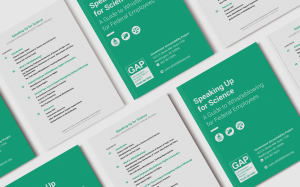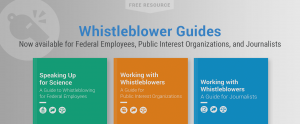May 8, 2018
Speaking Up for Science: Whistleblowing Is a Protected Right
Posted by Annika Deurlington
Today’s post is written by Dana Gold, Director of Education, Government Accountability Project (GAP)
Science professionals who refuse to stay silent in the face of direct evidence of abuses that betray the public trust—whistleblowers—are often the best mechanism for holding the powerful accountable and protecting the public interest.
Science whistleblowers have exposed inappropriate censorship of climate science documents intended for Congress and the public, halted work at the Hanford nuclear weapons facility because of dangerous unresolved technical issues, forced a recall of Vioxx that caused thousands of fatal heart attacks, and eroded support for a flawed multibillion-dollar weapons program justified by biased and incomplete research. In a political climate hostile to science, facts, and information transparency, whistleblowers are more important than ever.
Despite strong whistleblower protection rights, whistleblowing is complicated and risky. Seeking legal advice from attorneys experienced in helping whistleblowers before speaking out is always the safest course of action. It’s important to know your rights.
GAP has developed a new resource, Speaking Up for Science: A Guide to Whistleblowing for Federal Employees, that explains the legal rights of employees to blow the whistle and offers practical advice for making disclosures about wrongdoing in the safest and most effective ways possible.
Additionally, because employees often go to advocacy groups and the press to get problems addressed (though notably, 95% of whistleblowers first try to resolve issues internally), we have also developed guides for public interest organizations and journalists. These resources explain how to work with whistleblowers in ways that effectively use an employee’s information to promote accountability while prioritizing their protection.
This administration has prompted an unprecedented need for resources to support employees, particularly those in science-based agencies, who witness and want to disclose serious misconduct. After Donald Trump’s inauguration, several federal agencies, including the Environmental Protection Agency (EPA), the Department of Agriculture (USDA), and the Department of Interior (DOI), barred employees from speaking to the press and the public without prior approval. While those gag orders were immediately challenged, they were just the beginning.
Agencies have ordered “anti-leak training” for all federal employees, even though most employees are not involved in intelligence gathering and don’t have access to sensitive information. The Department of Energy hung posters reminding employees that “Every Leak Makes Us Weak.” The EPA directed staff to not take notes in meetings to prevent generating agency records. The Centers for Disease Control issued a “word ban” admonishing employees not to use words like “science-based” or “evidence-based” in budget documents.
There have also been personal attacks on whistleblowers. The EPA barred employees from speaking at a conference about the effects of climate change on the Narragansett Bay. The Department of Interior transferred senior policy advisor Joel Clement to a position collecting oil royalty checks after he continued to speak about the effects of climate change on Alaskan Native communities. A Department of Energy photographer was fired for publishing a picture documenting the close relationship between Secretary Rick Perry and a coal executive. Senior EPA staffers were demoted or fired for challenging Administrator Scott Pruitt’s excessive spending on security and travel and ethics conflicts.
Fear of reprisal is justified in this environment. But that shouldn’t stop whistleblowers from speaking out.
Federal employees have well-established rights, passed with bipartisan, unanimous Congressional support, to report evidence of serious wrongdoing they witness in the workplace free from reprisal. Under the Whistleblower Protection Act of 1989 and the Whistleblower Protection Enhancement Act of 2012, most federal non-intelligence agency employees have the right to disclose information they reasonably believe evidences:
- A violation of law, rule or regulation;
- Gross mismanagement;
- Gross waste of funds;
- Abuse of authority;
- A substantial and specific danger to public health or safety; or
- Scientific censorship that would result in any of the above forms of misconduct.
Further, federal employees have the right to report these forms of misconduct both internally—to management, coworkers, and agency inspectors general—as well as externally, such as to Congress, public interest organizations, or the press.
These guides are essential tools for helping science professionals understand their rights, risks and the best strategies for safely and effectively disclosing serious abuses of public trust. Please share the guides widely with your friends and colleagues, and learn more about how GAP supports science whistleblowers. To receive hard copies of our guide, to inquire about trainings, or to seek free legal advice about how to safely and effectively speak up for science, please contact GAP at [email protected] or 202.457.0034.
Founded in 1977, the Government Accountability Project (GAP) is the nation’s leading whistleblower protection and advocacy organization. A non-partisan public interest group, GAP litigates whistleblower cases, publicizes whistleblowers’ disclosures and develops legal reforms to promote government and corporate accountability.



